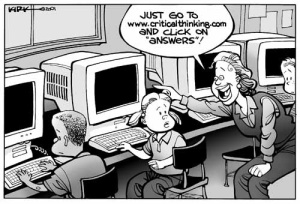Would you believe me if I said the object you see below made me question the decisions and priorities of my species, in not just one way but two?
I received this geeky apparatus as a gift earlier this year. Known as a Galileo thermometer, it uses the physics of density to display the approximate temperature of the environment. That’s neat and all, and every now and then I can derive from it a sense of awe at its scientific elegance, but the question I have to ask when I observe it is this: Was it worth the investment?
No, seriously — was it at all sensible for the givers of this present, good-willed though the gesture was, to spend on it dozens of dollars they surely could have directed towards more worthy ends? I don’t need my own thermometer, and so far this device hasn’t inspired any scientific epiphanies in me or anyone else (much less done so in a way that would require its physical presence in my room). I realize this isn’t a popular or comfortable idea, especially around this time of year in the United States. Surely it’s the thought that counts. Splurging helps the economy, right? People have the right to “waste” money on things with no secondary use, after all.
I wouldn’t endorse all these notions, and although it’s trivially true that we have that right, no one ever said rights were called rights because any exercise of them is right (that is, most wise or most helpful to the altruistic goals we tend to hold in the abstract). Whether it’s possible or desirable to mold our laws into actualizing such a definition of rights is its own interesting question, but the trouble remains. The costs (financial and social) of seemingly innocuous actions like giving a gift could very well outweigh the benefits.
And yes, the worst of these futile attempts to buy happiness (which some possessions can do indirectly, to be sure — without someone buying a typewriter, Stephen King would not have found the joy of publishing his novels — but not most) surface around the holidays. The thermometer was actually a birthday present, yet when I consider the mass of Christmas possessions I’ve found no use for that could not be performed by something better, the absurdity of this system becomes all too obvious.
How exactly have we convinced ourselves that this is sane? Expecting total commercial detachment from people is unrealistic, of course, and maybe even fortunately so, but ours is hardly a happy medium. I doubt this is a phenomenon unique to my history. Perhaps a degree of trivial distraction in our lives is psychologically healthy, but if it is, I’ll need more than just the bald hypothesis to accept that this is, in fact, the case.
I’ll be on the lookout for more satisfying answers and may post about them, but for now, this is all really quite mad.
To be clear, I don’t mean by any of this questioning to merely tear down the fun of the blue pill. My suspicion, rather, is that the blue pill isn’t even as fun in the first place as the more useful options we skip over constantly. If we admit this, we just might find ways of pursuing and producing more of what we value, than that which we accept as cheap substitutes for the best the world has to offer.
If your response to this is to point to science’s curious ability to become useful when we least expect it, you’ll want to stick around for my follow-up to this, in Part II.

